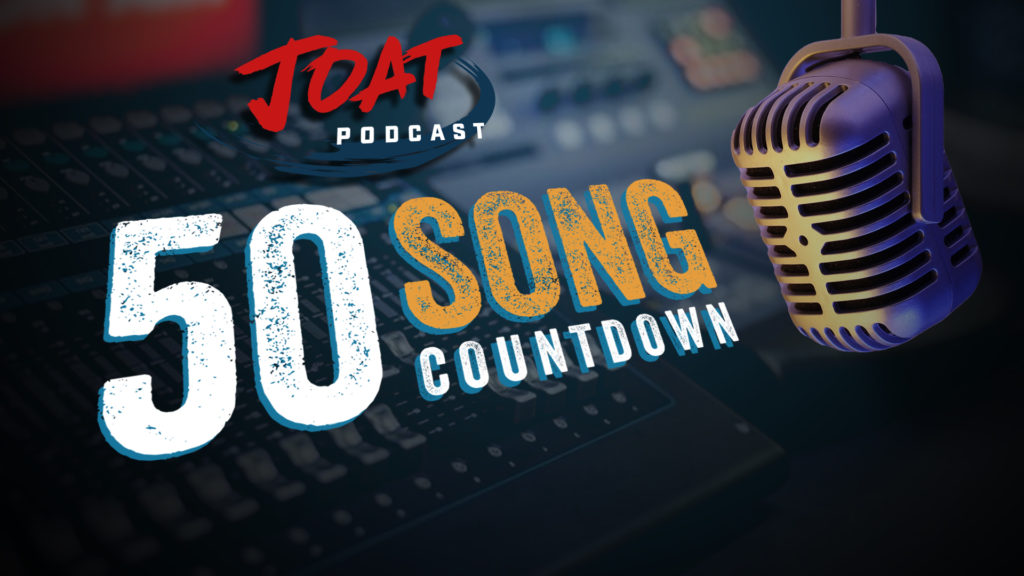The JOAT 50 Song Countdown is a blog series where every weekday for 10 weeks I am posting a brand new long form essay where I have ranked and written about my 50 favorite songs of all-time. From Adele to Zac Brown Band, Patsy Cline to Plasma Canvas, Ludacris to Rise Against, this series offers a personal essay about the 50 songs that hit me the absolute hardest.
Time is the only truly finite resource any of us has. It’s also the only truly level playing field.
This is why going to prison is called “serving time.”
In prison your time is not your own. Your days are regimented, and they are not up to you. There’s a scene early in The Shawshank Redemption where Andy Dufresne, along with his fellow new inmates, are addressed by the diabolical Warden Norton. One prisoner foolishly pipes up and asks, “When do we eat?” Captain of the guards, and noted sadist, Byron Hadley walks over and screams in his face, “You eat when we say you eat! You piss when we say you piss, and you shit when we say you shit! You got that?” He then forcefully jabs his baton into the prisoner’s solar plexus. Message received.
Johnny Cash is just about the coolest motherfucker who ever lived. Standing 6’ 2” wearing all black, with his deep, authoritative, booming bass voice, he seemed like he was 10 feet tall. He apparently wrote music’s coldest line “I shot a man in Reno just to watch him die” because he wanted “to think up the worst reason a person could have for killing another person, and that’s what came to mind.” He’s not wrong. His whole catalog is filled with dope shit like this, and I can listen to that imposing voice sing about marrying June “on a fever, hotter than a pepper sprout” or about how he would “search the honkytonks and bars and kill the man who gave him that awful name” any day and be happy.
I’ve never been to prison, never even been arrested. And from the outside looking in, prisons are terrifying places filled with freaks and monsters and deviants. Johnny Cash looks at a prison, picks the point of view of someone who has committed a heinous crime, and writes a song from that perspective capturing the very real human longing of a person who, yes, deserves punishment for their crimes, but who is also just like us in having dreams of a different life. The narrator in this song hears a train whistle and then imagines a) what’s happening in the train cars – probably rich people smoking and drinking coffee, which sounds excellent; and b) what he’d do if he were on that train. First on the list: Get as far away from Folsom Prison as possible.
The train represents freedom and opportunity, obviously. That train ain’t gonna stop, or at least not for very long in any one place, so if you want to get on, better be definitive about it. Railways in particular are beholden to a clock and people measure their utility by their punctuality. Tick tock. Tick tock. Want a better life? Better get on that train. Too scared of what’s on the other end of the line? Well, welcome to the Folsom Prison you just built inside your own mind. How long will you stay there? Tick tock.
It occurs to me that this is the second song on this list that overtly talks about prison, the other being “Dog Bumped” by Tim Barry. The key difference is the narrator in “Dog Bumped” sings “One quick minute got me 28 long years. But I’d do it again I don’t regret it,” because he shot the rich, small town asshole who beat up his sister. The narrator in “Folsom Prison Blues” shot a man just to watch him die. I don’t have a larger point here (Murder is the right call as long as you understand your motivations. Kidding!) except to say our choices have consequences. Are we prepared to live with the consequences of our decisions? Tim Barry’s narrator clearly is. Johnny Cash’s clearly has some regrets.
I served time in corporate and longed for the time I could be free. To be on that metaphorical train “on down to San Antone.” I reflected fondly on my time in graduate school as I didn’t know it at the time, but figured out my ideal work rhythm. I sat down with my thesis advisor at the beginning of my second year, and together we mapped out deadlines for my thesis. We started from the end goal – “Ok, so let’s plan on having you defend here.” We picked a date on the calendar and then backed out the other deadlines that led to it. Final revisions here, concluding chapter here, second chapter here, first chapter here, prospectus defended here… which brought us to when he needed the first draft of my first chapter. It was exactly one week from that meeting. I suddenly had a shitload to do, and while that made my body radiate with panic at first, a calm swept over me because now I had a general roadmap of how to accomplish this big task. All I had to do was fucking work, which is the easy part.
I didn’t miss a single one of those deadlines. My advisor – a brilliant man named Dr. Greg Dickinson, who is currently the Chair of the Department of Communication Studies at Colorado State University – was skilled enough to know how to structure a calendar like this, and all I had to do was follow it. Sometimes I wrote at a comfortable, measured pace. Sometimes I was doing last minute, white knuckle, marathon, middle-of-the-night, fugue state sessions the night before I was supposed to turn something in.
The point is, my time was just that – mine. I had control over my own workflow, and if I fucked up and missed a deadline, it was no one’s fault but mine. And I’m not in the business of letting myself down (at least not on the work front). Give me a deadline and I’ll beat it. Give me a budget and I’ll figure out a way under it. I’m as resourceful as I am diligent. So whatever you do, don’t tell me how I need to be spending my time. Tell me what you need from me and when, and I’ll get it done at the highest quality. How I spend my time in getting there is frankly none of your fucking business. I didn’t go from grad school to consulting right out of the gate – I had to work a few jobs to figure things out first – but I always reflected romantically on my time in grad school and its rhythms. I knew what I had to do, but I also had to serve some time first.
When you get right down to it, time is our only true adversary, and it’s undefeated. The best we can do in fighting against time is ensuring our days are spent valuably, and in seeking various forms of fulfillment – professionally, spiritually, romantically, platonically, intellectually, etc., ad infinitum. What Johnny Cash has done in “Folsom Prison Blues” is two things:
1. He’s written and performed one of the most badass songs in the history of music.
2. He’s also tapped into the great existential question of our lives. No matter who you are, you can put yourself in one of two locations in this song.
Are you on that train enjoying its amenities and heading toward a desirable destination?
Or are you stuck in Folsom Prison as time keeps draggin’ on?
(This essay was modified substantially on 3/5/24 because the author found the previous version unsatisfactory.)
Up next: I could be like you. I could be alone and jaded wondering what to do to make them pay…

